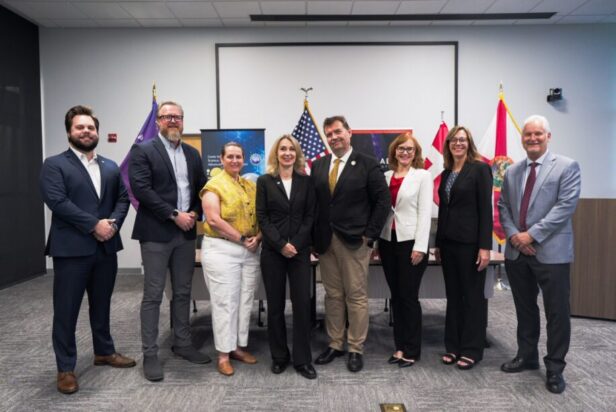FOR IMMEDIATE RELEASE
August 15, 2025
CAPE CANAVERAL, Fla. — The University of Florida (UF), through a coalition of space-focused initiatives including the Astraeus Space Institute, the In-Space Biomanufacturing Innovation Hub (In-Space Bio Hub), and the Center for Science, Technology, and Advanced Research in Space (C-STARS), has signed a memorandum of understanding (MOU) with two prominent Swiss institutions—the Center for Space and Aviation Switzerland and Liechtenstein (CSA) and Switzerland Innovation Park Zurich (IPZ).
This agreement aims to foster international collaboration in space research, in-space manufacturing, and space-related workforce development. By leveraging the expertise and resources of both UF and its Swiss partners, the initiative seeks to advance innovation in emerging space technologies while creating new educational and professional opportunities in the global space sector.
The MOU, signed this week, marks the launch of a trans-Atlantic initiative aimed at accelerating in-space manufacturing through joint research projects, academic exchanges and shared access to flight and testing facilities.
Under the agreement, the parties will collaborate on a wide range of strategic areas, including space-enabled production of biopharmaceuticals, recycling capabilities, tissue engineering and the commercialization of these space-based technologies. The partnership will also support initiatives aligned with the goals of the United Nations Office for Outer Space Affairs.
“We at the UF Astraeus Space Institute are excited and very pleased to be linking this alliance with the Center for Space and Aviation Switzerland and Liechtenstein and Switzerland Innovation Park Zurich . The chance to increase international collaborations and to center those collaborations at the Space Coast is both satisfying and timely,” said Rob Ferl, director of the Astraeus Space Institute at UF.
CSA, which is under the strategic direction of the Zurich cantonal government, and IPZ, a cornerstone of Switzerland’s national innovation strategy, bring significant infrastructure and policy leadership to the collaboration. Together with UF, they will work to open new opportunities for access to parabolic and low-Earth orbit flights, as well as future lunar research missions.
Elisabeth Stark, vice president of research at the University of Zurich and a member of the board of trustees at the Center for Space and Aviation Switzerland and Liechtenstein, emphasized the strength of the new partnership.
“What makes this partnership exceptional is not only our shared goals, but how naturally our institutions fit together, with each partner bringing specific strengths that enrich the whole,” Stark said. “The CSA and the University of Florida share a clear strategic vision: to build globally relevant space ecosystems that are both locally rooted and internationally connected. This agreement is an important step in realizing that vision.”
Oliver Ullrich, chairman of the Center for Space and Aviation Switzerland and Liechtenstein and director of the Innovation Cluster Space and Aviation at the University of Zurich, added, “Switzerland, the global number one in innovation for more than a decade, now joins forces with one of the United States’ most advanced space ecosystems.”
The international partnership marks a major step forward in advancing the technical capabilities of in-space manufacturing, harnessing cutting-edge research in synthetic biology, regenerative medicine, and intelligent process automation to enable sustainable, on-demand, in-space production of high-quality materials and therapeutics.
By leveraging UF’s In-Space Biomanufacturing Innovation Hub and C-STARS, along with Switzerland’s innovation infrastructure and aerospace expertise, the collaboration will accelerate the development of scalable, resilient manufacturing platforms that operate efficiently in microgravity—paving the way for next-generation space exploration, human health solutions, and a sustainable space economy.
“This partnership reflects the increasing global momentum behind in-space biomanufacturing,” said Siobhan Malany, director of the In-Space Biomanufacturing Innovation Hub and C-STARS and associate professor in the Department of Cellular and Systems Pharmacology at the University of Florida. “By combining UF’s research leadership in biomedical and biomanufacturing sciences with the Swiss commitment to innovation and precision engineering, we are creating a foundation for transformative capabilities that will shape the future of healthcare and industry in space.”
The University of Florida is home to a growing number of space-focused programs driving research, innovation and workforce development in space science and technology. The Astraeus Space Institute fosters interdisciplinary collaboration in aerospace systems, human spaceflight, and policy. The In-Space Bio Hub pioneers bioproduction technologies for microgravity environments, advancing synthetic biology and regenerative medicine. C-STARS supports cutting-edge research and partnerships that expand human capabilities in space. Together, these entities position UF as a national leader in the emerging space economy.
The agreement was signed by representatives from all three institutions and will be in effect for an initial term of one year, with the opportunity for renewal based on mutual interest and measurable progress.
